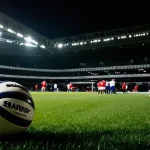UK Sports and the Formation of National Identity
The history of sports in the UK is deeply intertwined with the development of British national identity. From medieval times, sports such as football, cricket, and rugby have not only entertained but also created a shared cultural experience that resonates across generations. These activities acted as unifying forces among disparate regions, forging a sense of belonging and pride.
Traditional games like cricket, associated with English countryside and gentlemanly conduct, and football, emerging from working-class urban areas, reflect the diverse social fabric of the UK. Each sport carries unique traditions that have become symbolic markers of British heritage. The origins of modern football rules, codified in the mid-19th century, illustrate the UK’s pioneering role in formalizing sports globally, a source of national pride.
Also read : What Strategies Are UK Sports Teams Using to Foster Inclusivity?
Landmark events such as the FA Cup final or the Rugby Six Nations Championship bolster collective identity by bringing communities together. These events generate widespread enthusiasm, reinforcing shared values and cultural narratives. Thus, UK sports serve not only as entertainment but as potent symbols of national legacy and unity.
The Role of Sports in Bridging Cultural Divides
Sports in the UK play a crucial role in fostering cultural unity by bringing together diverse communities. Major sports events, such as the FA Cup or the Rugby Six Nations, act as shared experiences that transcend social and ethnic boundaries, creating powerful moments of collective celebration. These gatherings help promote sports and social cohesion, uniting fans from various backgrounds under a common passion.
This might interest you : How Can UK Sports Foster Community Development?
Initiatives within UK sports leagues actively promote inclusivity through sports by encouraging participation across genders, ages, and ethnicities. Programs aimed at youth engagement in football, cricket, and rugby address social divides by offering equal opportunities. This inclusivity nurtures a sense of belonging, reinforcing both local and national identities rooted in shared sporting traditions.
Moreover, sports serve as a platform for multicultural representation, showcasing the UK’s diverse population. Players from different ethnicities and cultures becoming national heroes highlight how sports can mirror the inclusive values of society. This representation strengthens cultural bridges and advances an understanding that UK sports are not merely competitions but vital channels for unity and social integration.
Case Studies: Football and Rugby as Vessels for Unity
Football in UK culture is a powerful force shaping national pride and social cohesion. Tournaments like the FA Cup and the Premier League attract fans nationwide, fostering unity beyond regional affiliations. The shared passion for football creates collective experiences where emotions and loyalties intersect, making these events more than just games—they become cultural milestones.
Rugby traditions also play a crucial role in both national and regional identities. The sport’s prominence in nations like Wales and Scotland highlights how rugby can symbolize local heritage while contributing to broader UK unity. Matches such as the Six Nations Championship evoke deep emotional connections, blending competition with a sense of belonging.
Case studies reveal moments when football and rugby transcended sport, inspiring cross-community solidarity. For instance, joint fan initiatives during international tournaments showcase how football and rugby can bridge divides, promoting social cohesion. These examples emphasize sports’ unique ability to unite diverse groups through shared narratives and celebratory rituals rooted in UK sports culture.
Overall, football and rugby serve as excellent illustrations of how sports influence unity, reinforcing cultural identity while encouraging inclusivity and mutual respect across the UK.









